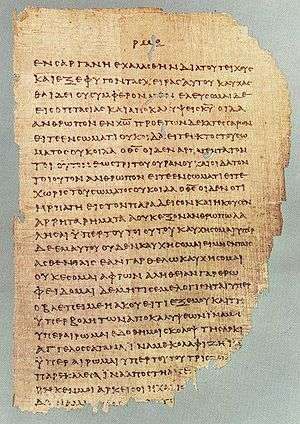Synod of Jerusalem (1672)
The Synod of Jerusalem was convened by Greek Orthodox Patriarch Dositheos Notaras in March 1672. Because the occasion was the consecration of the Church of the Nativity in Bethlehem, it is also called the Synod of Bethlehem.
The Synod was attended by most of the prominent representatives of the Eastern Church, including six Metropolitans besides Dositheus and his retired predecessor, and its decrees received universal acceptance as an expression of the faith of the Eastern Orthodox Church.
Calvinist controversy
In 1629, a small book, attributed to Cyril Lucaris, the Patriarch of Constantinople, and commonly referred to as the Confession of Cyril Lucaris, was published in Latin at Geneva. It contained an eighteen-point summary of beliefs that conformed with Calvinist teaching. French, English and German translations appeared in the same year. A Greek version called Eastern Confession of the Christian Faith appeared in Constantinople in 1631.[1] In view of this book, Lucaris has been accused of adopting in his book Calvinistic views and asserting that Calvinism was in fact the faith of the Eastern Church. His Orthodox defenders claim that the book was a forgery. Cyril himself verbally denied authorship, but did not disavow it in writing.[2]
The opposition to Calvinism arose during Lucaris's lifetime and continued after his murder in 1638 while in Ottoman custody. It found classic expression in the highly venerated confession of Petro Mohyla, Metropolitan of Kiev (1643). Though this was intended as a barrier against Calvinistic influences, certain Protestant writers persisted in claiming the support of the Greek Church for their positions.
Refutation of Calvinism
The Synod refuted the Confession of Lucaris article by article,[1] seeking to put an end to the Calvinists' theses of unconditional predestination and of justification by faith alone, and to reassert traditional Orthodox doctrines about the Real Presence of Christ in the Eucharist and the fate of the soul after death, which some commentators have regarded as substantially the same as the Roman Catholic views of transubstantiation and personal eschatology.[3]
Against both the Roman Catholic Church and most Protestants, the Synod affirmed that the Holy Ghost proceeds from God the Father alone and not from both Father and Son.[4] This rejection of the Filioque clause was not unwelcome to the Turks, though it does not mean that the decisions were made under political pressure from the Ottoman Empire. Protestant writers say that the eastern hostility to Calvinism had been fanned by the Jesuits.[5]
In the Synod's decrees, called the Confession of Dositheus, it reaffirmed existing Orthodox beliefs incompatible with Calvinist doctrines, restating that apostolic succession of bishops is necessary, that good works done with faith are required for salvation, that there are seven sacraments, that the Eucharist is both sacrament and sacrifice, offered for the dead as well as for the living.
The Synod refused to believe that the heretical confession it refuted was actually by a former patriarch of Constantinople, contending that the Confession of Cyril was a forgery.
In their correspondence with the 18th-century Non-Juror Anglican bishops, the Eastern Patriarchs insisted on acceptance of the Synod's teaching on transubstantiation.[6]
Importance and criticism
The 1911 Encyclopædia Britannica called the Synod of Jerusalem "the most vital statement of faith made in the Greek Church during the past thousand years."[7] Protestant scholar Philip Schaff wrote "This Synod is the most important in the modern history of the Eastern Church, and may be compared to the Council of Trent."[8] However, modern Eastern or Greek Orthodoxy is much more reserved about the abiding dogmatic authority of this synod. The fact that the Greek bishops often received their training at Latin schools (notably in Venice) accounts for what the late Georges Florovsky termed the "pseudomorphosis" of Orthodox theology.
Subsequent regional synods have certainly felt free to revisit the issues addressed in Jerusalem. Hence, on the issue of the Old Testament canon, a different position was adopted in the Longer Catechism of Philaret of Moscow.
English translation of the decrees
The Acts and Decrees of the Synod of Jerusalem was translated directly from the Greek, and edited with notes, by J.N.W.B. Robertson (London, 1899). The text of Chapter VI, which sets forth the Orthodox faith in eighteen decrees and four questions, commonly known as The Confession of Dositheus, can be consulted at the Web site The Confession of Dositheus (Eastern Orthodox 1672) or Confession of Dositheus.
References
- 1 2 The Greek Orthodox Position on the Confession of Cyril Lucaris (1943) by George P. Michaelides
- ↑ Ecumenical Patriarchate: Cyril I Lucaris
- ↑ The Synod of Jerusalem and the Confession of Dositheus
- ↑ Decree 1 of Confession states: "We believe in one God, true, almighty, and infinite, the Father, the Son, and the Holy Spirit; the Father unbegotten; the Son begotten of the Father before the ages, and consubstantial with Him; and the Holy Spirit proceeding from the Father, and consubstantial with the Father and the Son. These three Persons in one essence we call the All-holy Trinity, — by all creation to be ever blessed, glorified, and adored" (Calvinism as Heresy).
- ↑ "Jerusalem (After 1291)". Catholic Encyclopedia. 1913. Retrieved 2008-07-10.
- ↑ "They are furious about the Non-Jurors' denial of transubstantiation (after the Bethlehem synod) and they call the Non-Jurors' denial, criticism, even hesitation, blasphemous" (H.W. Langford, The Non-Jurors and the Eastern Orthodox).
- ↑ Jerusalem, Synod of in the 1911 Encyclopædia Britannica
- ↑ "Creeds of Christendom".
Further reading
- Wetzer-Welte Kirchenlexikon, 2nd ed., vi . 1357 sqq
